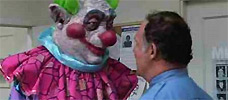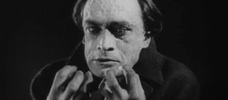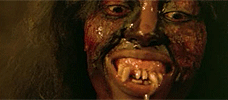Reviews
H.P. Lovecraft’s From Beyond
Stuart Gordon
USA, 1986
Credits
Review by Matthew Derby
Posted on 01 October 2009
Source MGM DVD (Director’s Cut)
External links
H.P. Lovecraft’s original short story
Categories 31 Days of Horror VI
The writing of H.P. Lovecraft has long been held as prime evidence that there is a place in the literary canon for the horror genre. This may explain, at least in part, why horror filmmakers - a ragged, self-conscious cadre of idealists always in search of a defensible outpost in the war against the critics - are still mining his work for inspiration, seventy-five years after his death. Lovecraft was a voracious reader who, in addition to studying the work of his heroes Poe and Lord Dunsany, pored over all of the major horror pulp magazines of the early twentieth century. Despite his attraction to pulp, he was frustrated at its lack of refinement. He once lamented that “someone ought to go over the cheap magazines and pick out story-germs which have been ruined by popular treatment; then getting the authors’ permission and actually writing the stories.” One wonders what he might think of the film industry’s unending quest to translate his own tales of the supernatural to the screen. Each adaptation has, in its own way, failed to evoke the particular horrors in which Lovecraft traded; chiefly the oppressive vastness of the cosmos and humanity’s utter insignificance in the face of time. But a handful of directors have managed to wrest a kernel from Lovecraft’s original texts and make it into something distinct and compelling. The most interesting and memorable Lovecraft adaptations to date (although if Guillermo Del Toro’s upcoming take on “At The Mountains of Madness” is able to advance upon Pan’s Labyrinth’s disturbing, surreal visuals, it may significantly tip the scales) have come from Stuart Gordon, a low budget auteur whose first film, a contemporary take on Lovecraft’s “Herbert West: Re-Animator,” played loose with the source material, infusing it with a unique mix of restrained campiness, gonzo bloodsplatter, and deadpan, gallows humor, to the delight of critics and horror fans alike.
Gordon’s follow-up, 1986’s From Beyond, is also a Lovecraft adaptation, although it strays even further from the original seven page story about a scientist who has built, in his attic laboratory, a machine that “wakes a thousand sleeping senses” which are inherited “from aeons of evolution from the state of detached electrons to the state of organic humanity.” Once awakened, these organs reveal a terrifying multitude of organisms that crowd the air around us, writhing in a dimension outside time and space.
The film version compresses Lovecraft’s story into a tight pre-title sequence—it follows, instead, a set of newly created characters, each of whom is gradually drawn into the world of the mad scientist’s creation. Lovecraft purists may balk at Gordon’s comprehensive departure from the story, but this decision allowed him to riff freely on the themes suggested in the original—adding, for good measure, a host of dismemberments, decapitations, and glistening, mutated flesh. Most significantly, Gordon takes the concept of organ stimulation to its logical extreme. In the film, the machine’s creator, Dr. Edward Pretorius, is an impotent sadist who can only achieve a sort of vestigial sexual pleasure by luring women into a specially outfitted room in his house to film and torture them. He’s convinced that the pineal gland is a dormant sensory organ that, when awakened, can yield pleasures unknowable to humans. He builds the Sonic Resonator (as the machine is called in the film) to act as a massively complex, remote prosthesis that will, he hopes, not only resurrect his virility, but will tap into the infinite pleasures afforded by the new, unseen dimensions he believes exist just beyond our reach.
Pretorius is quickly beheaded, on the night of the Resonator’s trial run, by a slick, fleshy bat creature, leaving only his assistant, Crawford Tillinghast, played with masterful determination by Jeffrey Combs, to contend with the mess. Nobody, of course, believes Tillinghast’s breathless rant about Pretorius’s device and the horrifying creatures it beckons, and he’s institutionalized in advance of the trial for Pretorius’s murder. Enter Dr. McMichaels, a leading psychiatrist noted in the field for her belief that schizophrenics should not be locked away. McMichaels persuades Tillinghast’s captors to release him into her care so that she can determine whether he’s truly guilty for the Pretorius murder. This naturally means that they must return to the scene of the crime and fire up the Resonator again, under the wide-eyed supervision of Buford ‘Bubba’ Brownlee (Dawn of the Dead’s Ken Foree), a hulking, good natured cop in a football jersey who delivers arguably the best line in the film after their first experience under the influence of the resonator: “Is there a statistical correlation for the hard on I just got?”
The Resonator affects the three characters differently: Tillinghast’s pineal gland eventually bursts through his skull, where it thrashes against his forehead like a perverted snake. He develops a taste for human brains, an unexplained and unfortunate consequence of the Resonator that yields what is arguably the first onscreen instance of a man sucking a woman’s brain through her eye socket. McMichaels, on the other hand, becomes intractably aroused by the Resonator. She cannot stay away from the device, even after Pretorius pays a visit from another dimension, his flesh repulsively burled and rippled, sliding off his skull like a wet paper sack. Bubba, the film’s ill-fated moral compass, is merely perturbed by the machine. McMichaels and Tillinghast, though, are gradually undone by the power of the Resonator. They are victims of their own inability to comprehend or control the newly awakened senses with which they’ve been imbued. And it’s this point - that the heroes of the film are also its enemies and its victims - that elevates From Beyond out of the predictable wasteland of shock cinema. There is one sequence near the end of the film where a nurse finds an at-large Tillinghast crouched over a bucket of discarded brains, haplessly devouring a bloody frontal lobe. “Crawford,” the nurse says with a restraint and patience that is simultaneously comic and urgent, “please don’t eat those.” Tillinghast stares at the brain in his hands, puzzled at his own behavior. “But they’re delicious,” he says, almost despite himself. It’s a darkly hilarious moment that underscores the central theme of the film—that we are victims to the transient desires of our bodies. Gordon says in the special features commentary of the DVD release that, “horror and sex go hand in hand… the two of them are life and death.” Although Lovecraft, were he alive today, might not approve of From Beyond’s camp and blood-drenched prurience, this is a sentiment about which the author and director are certainly in agreement.
More 31 Days of Horror VI
-

From Beyond
1986 -

The Haunting
1963 -

Killer Klowns from Outer Space
1988 -

Shock ‘Em Dead
1991 -

Critters
1986 -

Critters 2
1988 -

The Fall of the House of Usher
1928 -

Jonestown: The Life and Death of Peoples Temple
2006 -

In the Mouth of Madness
1994 -

Winterbeast
1991 -

Black Roses
1988 -

Needful Things
1993 -

The Seventh Victim
1943 -

A Page of Madness
1926 -

Holocaust 2000
1977 -

The Man and the Monster
1958 -

The Texas Chainsaw Massacre 2
1986 -

Trick or Treat
1986 -

Single White Female
1992 -

Trouble Every Day
2001 -

The Hands of Orlac
1924 -

The Devil’s Advocate
1997 -

Nocturne
1998 -

Hardware
1990 -

Hard Rock Zombies
1985 -

The Slumber Party Massacre
1982 -

Saw VI
2009 -

Zombi 4: After Death
1988 -

The Uninvited
1944 -

Hausu
1977
We don’t do comments anymore, but you may contact us here or find us on Twitter or Facebook.



